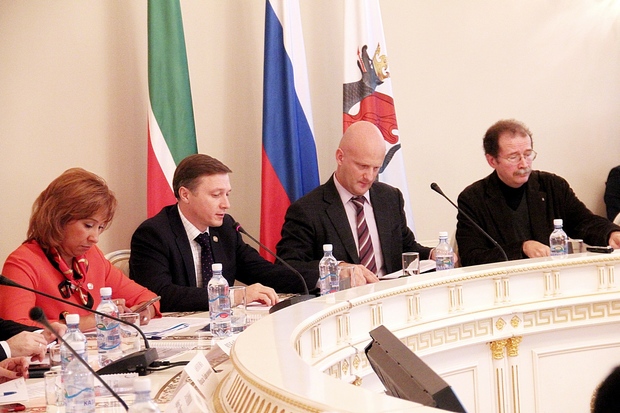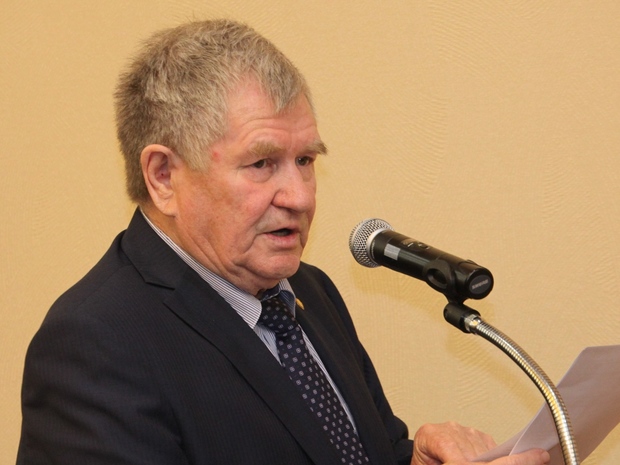‘They associate their future with the yard! People dropped out of the process of creating the future’
Tatarstan business elite and officials were invited to the session of Kudrin’s experts to discuss the strategy for Russia
What challenges hinder economic growth and whether it is possible to develop immunity to recurring crises in the country? Under the significant slogan 'Looking to the future. What Russia will be like in 10 years', the experts of the Center for strategic research held the first of a two-hour discussion among the business elite of Tatarstan for the preparation the presidential economic program. The return message was ambiguous: the strategists-economists castigated the Russian oligarchs for the pressure on economic policy, and the municipalities innocently wished Russia to stop trying to compete with everyone on the world market.
The Kudrin's experts will take economical 'tests' in seven regions of the country
The team headed by the former Minister of Finances of Russia Aleksey Kudrin has developed the new program for the development of the country to start in 2018. The presidential elections will also take place in 2018. In fact, the CSR (Centre for Strategic research) has started to prepare for the presidential elections.
Realizing the importance of the forthcoming program, many industry ministers, chairmen of parliamentary committees of the State Council, the industrialists, the leaders of many municipalities — all from whom the CSR experts expected live dialogue on the problems of economic development of the country – attended the working session at the Kazan city hall. By the way, Kazan is among the seven major cities that will host the visiting strategic sessions of the CSR.
'In a large and diverse country, we have distinguished such regions that strongly stand out against the background,' explained the head of the project of the CSR Andrey Yakovlev. 'Therefore, we have chosen Vladivostok and Sevastopol. Kazan and Voronezh 'stood out' as the regions with the best practices, and Yekaterinburg and Rostov — the centres, where the economic activity is concentrated'. In other words, the experts will take 'tests' of the economic condition of the country in these regions to prepare a presidential program.

Stop seeking a compromise between financial groups
Explaining the task of a session in Kazan, Andrey Yakovlev, the head of the expert group CSR, said that the country's leadership understands that the country faces serious technological challenges. 'We should compete in the global space. Without accelerated technological development based on industrial base of the country, we will not be able to secure our positions — neither economic, nor social, nor political. The question is, where are the sources of economic growth? How to ensure a worthy place for Russia in the world by all major parameters — economic, social, geopolitical? In fact, we need to find possible solutions to achieve this goal,' he said. The expert believes that the building of a coherent and feasible programme is impossible without understanding 'what are the challenges you face in the regions and what solutions they are willing to offer,' and the experts intend to depart from ideological patterns. The most important thing is to ensure economic growth.'
However, the head of the Committee on Economy and Finance Marat Galeyev shifted the discussion to the federal plane by asking a rather provocative question about the strong influence of the oligarchy on the economy. In his opinion, the economic policy of the country is strongly influenced by large financial-industrial groups, which often pursue their own interests, and they are above the interests of the country. In his opinion, the influence of the oligarchy — it is a serious challenge, and we need a strong political will for leveling.
Andrey Yakovlev agreed that such problem does take place. 'The influence of such groups is not unique to Russia, it happens even in the most democratic countries,' he said later in an interview with Realnoe Vremya. 'But the system of counterweights is built this way. We have long worked to build a similar model. The adjustment of the politics under their interests led to the 1998 crisis, and now we are in a similar situation in terms of expectations for the future.'

It is terrible when people see the future only in the improvement of the yard
However, he is more concerned about the disengagement of the population, they 'begin to get clogged in their interests, cease to be interested in the economy and strategy of the country.'
'In the survey on the website of Kazan we asked the question: what problems do you see in the future for yourself. And everyone wrote — landscaping of the yard!' pathetically exclaimed Vladimir Gritskikh. 'They associate their future with the yard! No one discusses the problems of education — it's weird. In my opinion, this is the main threat to the country because people dropped out of the process of creating the future of the country. We are not interested in the competition with Bashkiria, you have to be competitive on a global level,' he gasped.
After a pause, he went on to talk about competitiveness. 'Whether we like it or not, but we have to admit that the whole country will not be able to develop equally,' he said. 'In any case, there will be leaders and near leaders there will be industrial and educational clusters,' Greckich hinted on Tatarstan.
Marat Safiullin also pointed to the weak position of Russia in the world: 'Occupying less than 2% of global GDP, it is difficult to speak about a mainstream or on the formation of the own path,' he said. 'In order to promote something on the world market, you need some economic mass, which we lack.'
The head of Tatneftehiminvestholding Rafinat Yarullin blamed the federal authorities for being in the country there is ineffective processing of raw materials. 'We could develop the gas processing industry, which requires 30 billion rubles, but we are building the South stream,' he said. 'We should process not only gas, but wood, metal and even waste,' he called.

'Maybe we should just sell water? And the whole world will stand in queue?'
The heads of municipal formations, on the contrary, are glad that 'people are more interested in the yards and environment'. The representative of the Executive Committee of Kazan suddenly complained of the weak index of business activity of entrepreneurs, constrained by administrative barriers. 'In our view, not enough is being done to unleash the potential of small business as a source of economic development and the budget,' he explained. ' We need to develop clear algorithms, to reduce administrative barriers. Impetus for entrepreneurship development would be the development of manufacturing industries, and hence human capital.' The head of Zelenodolsky rayon Aleksander Tygin even proposed to stop the race for being the world leaders. 'As I remember, we always want someone to beat! Maybe, we should stop to compete with everyone? Maybe we should just sell water? And the whole world will stand in queue? I propose to stop the race,' he smiled.
During a break, Andrey Yakovlev told the journalists that the program would be ready by May of this year. 'The program will not have financing, but it will include projects for its implementation. In fact, they will be associated with new presidential cycle,' he said, hinting that the program is not a 'dummy' for businesspersons.